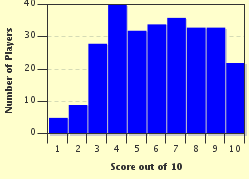Quiz Answer Key and Fun Facts
1. What is the auxiliary verb needed to form the compound tenses in Spanish?
2. Which is the present indicative first person of hablar, which in Spanish is the word meaning to talk?
3. What is the conditional perfect first person of the verb aplaudir (to applaud), which in Spanish means to applaud?
4. The present subjunctive of the verb ir is vaya, vayas, vaya, vayamos, vayais, vayan? (Ir in Spanish means to go).
5. What is the present perfect second person singular indicative of the verb tener? (Tener is one of the two verbs in Spanish that means "to have".)
6. Mandaba is the imperfect tense, first person singular in Spanish for the verb mandar.
7. Which of these is NOT a mood of verb in Spanish?
8. For verbs ending in -ar, which two tenses have the same nosotros form? In Spanish nosotros means us. It may help to think of other languages.
9. Ser is one of the two verbs in Spanish that means "to be" (the other is estar). What is the present subjunctive of ser?
10. "Para el martes, habre hecho todas las preparaciones"
Hecho is one of the irregular past participles in Spanish. Which verb in Spanish does it come from and which tense is the sentence in?
Source: Author
RoyalVishIII
This quiz was reviewed by FunTrivia editor
stedman before going online.
Any errors found in FunTrivia content are routinely corrected through our feedback system.


